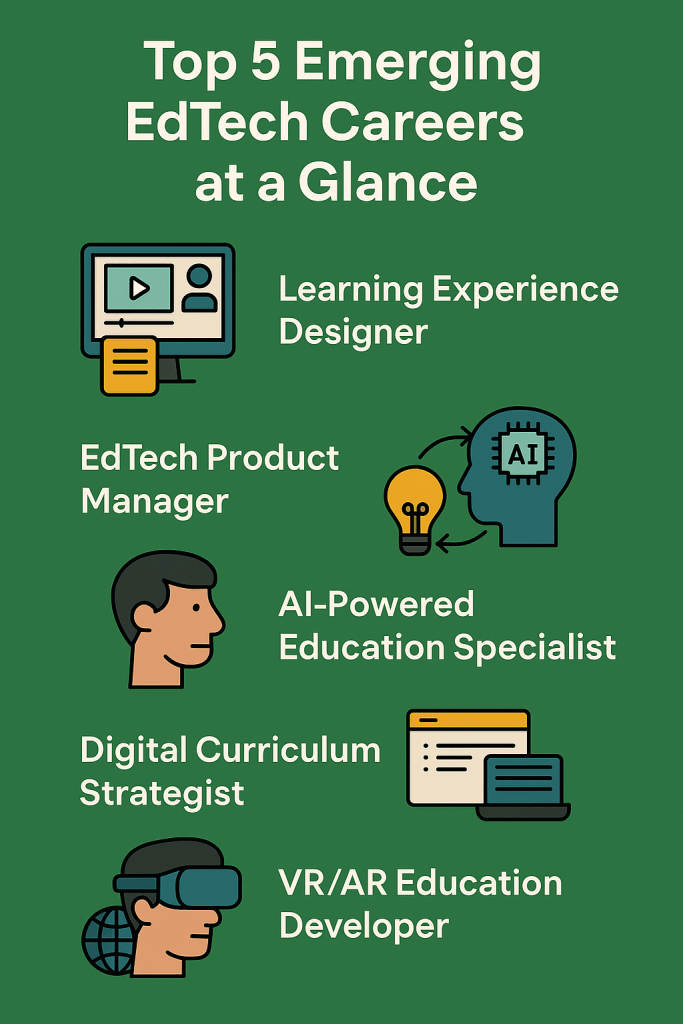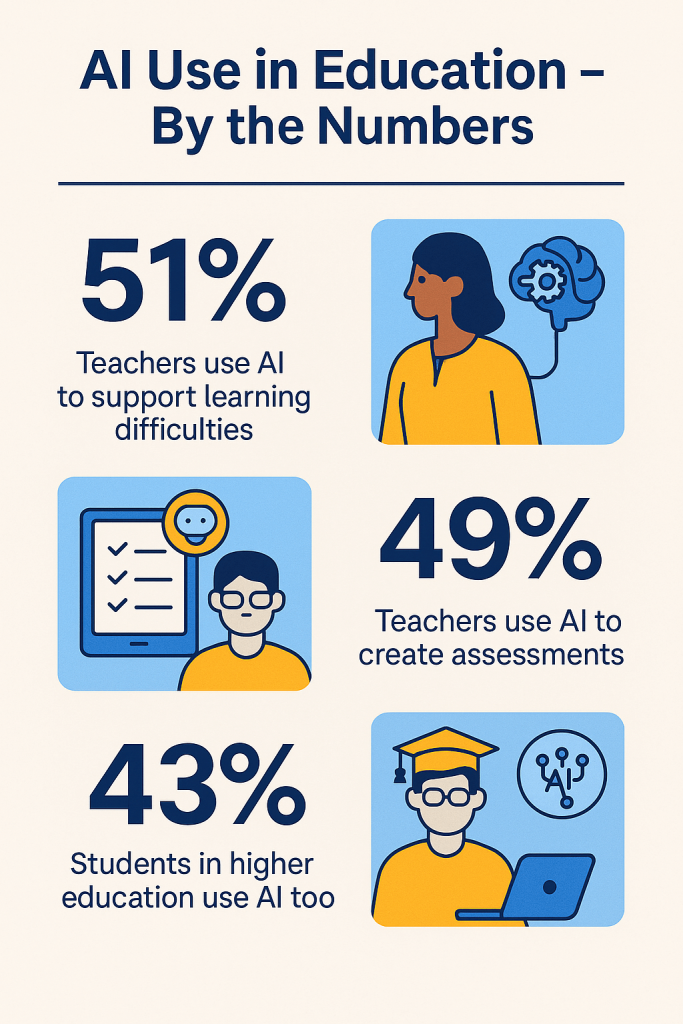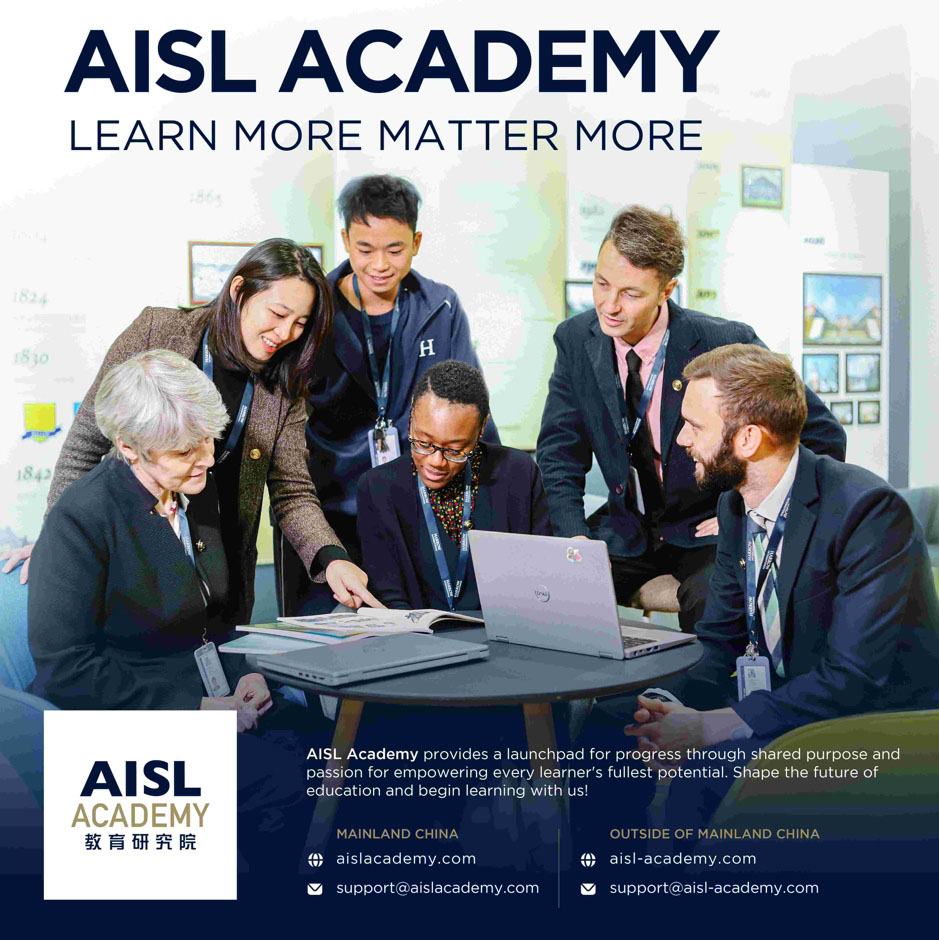As technology reshapes the way we teach and learn, education is entering a new era, which is one where digital tools, data, and innovation play an increasingly central role in the classroom. For many educators, school leaders, and parents, this shift brings both excitement and uncertainty. What will the future of learning look like? And more importantly, what kinds of roles will be needed to support it?
In this article, we explore five emerging career paths in educational technology that are gaining momentum across schools, education companies, and learning institutions. From learning experience design to AI-powered learning support, these roles are redefining what it means to work in education. Whether you’re guiding a student toward future opportunities or considering a career move yourself, this guide offers practical insights into where the field is headed and also why these roles matter.
1. Learning Experience Designer (LXD)
What Does a Learning Experience Designer Do?
Learning Experience Designers (LXDs) combine instructional design with user experience (UX) thinking to create digital environments that are intuitive, engaging, and tailored to student needs. Their work often bridges the gap between pedagogy and technology, ensuring learning tools and content are not only accurate but also enjoyable to use.
For example, an LXD might develop an interactive humanities module for middle school students, incorporating short videos, reflection prompts, and real-time progress tracking to support personalised learning.
Skills and Tools Required
LXDs typically bring together:
- Knowledge of design models like ADDIE and Bloom’s Taxonomy
- Experience with UX design tools such as Figma or Adobe XD
- Familiarity with Learning Management Systems (LMS) like Canvas or Moodle
While coding is not essential, being able to collaborate with developers and understand digital workflows is highly beneficial.
Why It’s Emerging
As schools adopt more blended and online learning strategies, the need for high-quality digital learning experiences has grown rapidly. According to HolonIQ’s 2023 Global Education Outlook, improving learner engagement and digital experience with a long-term view is now a top priority for educational institutions worldwide. LXDs are central to making that vision a reality.
2. EdTech Product Manager
Bridging Education and Innovation
EdTech Product Managers play a crucial role in developing digital tools that meet the real-world needs of teachers and students. They collaborate across teams to translate classroom challenges into tech-driven solutions, balancing usability, pedagogical value, and scalability.
For instance, one product manager might lead a team to build an app that streamlines parent-teacher communication, while another focuses on improving a platform for student self-assessment.
What Makes a Strong Candidate?
Many successful EdTech Product Managers have:
- A background in education, UX research, or digital product design
- Project management experience (Scrum, Agile)
- Strong interpersonal and cross-functional collaboration skills
- An ability to think strategically while focusing on user needs
Educators moving into this space often bring an invaluable lens to product development, ensuring tools align with real classroom dynamics.
Why Schools and Startups Need Them
With global investment in EdTech still strong, the demand for thoughtful, education-focused product leadership is on the rise. As noted in HolonIQ’s 2023 EdTech Funding Insights, product development remains a top investment priority for education companies worldwide, making this a rapidly expanding career path.

3. AI-Powered Education Specialist
What Does an AI-Powered Education Specialist Do?
AI-Powered Education Specialists design and implement intelligent systems that personalize learning experiences, automate assessments, and provide real-time feedback. They collaborate with educators to integrate AI tools that adapt to individual student needs, enhancing engagement and learning outcomes.
For instance, platforms like Kira Learning utilize AI agents to assist teachers with grading, lesson planning, and analyzing student performance, allowing educators to focus more on mentoring and personalized instruction.
Skills and Tools Required
Successful AI-Powered Education Specialists often possess:
- Proficiency in data analysis and machine learning concepts
- Understanding of educational psychology and instructional design
- Familiarity with AI tools and platforms used in educational settings
- Strong collaboration skills to work with educators and technologists
A background in both education and technology is highly beneficial, enabling specialists to bridge the gap between pedagogical goals and technical implementation.
Why It’s Emerging
The integration of AI in education is rapidly expanding. A report by AIPRM indicates that approximately 51% of teachers use AI tools to support students with learning difficulties, and 49% utilize them for creating assessments and quizzes. Moreover, around 43% of students in higher education institutions use AI-powered tools to enhance their learning experiences, as noted by Artsmart.ai.

As AI continues to transform educational landscapes, the demand for specialists who can effectively implement and manage these technologies is on the rise.
4. Digital Curriculum Strategist
What Does a Digital Curriculum Strategist Do?
Digital Curriculum Strategists play a pivotal role in shaping and implementing comprehensive digital learning frameworks within educational institutions. They collaborate with educators, administrators, and technology teams to integrate digital tools, platforms, and content into cohesive curricula that align with educational standards and learning objectives.
For instance, a Digital Curriculum Strategist might lead the development of a district-wide digital literacy program, ensuring that students acquire essential 21st-century skills such as critical thinking, collaboration, and technological proficiency. They also evaluate the effectiveness of digital resources and make data-driven decisions to enhance learning outcomes.
Skills and Tools Required
Successful Digital Curriculum Strategists often possess:
- Expertise in curriculum design and instructional strategies
- Proficiency with Learning Management Systems (LMS) like Canvas or Moodle
- Familiarity with digital content creation tools and educational technologies
- Strong analytical skills to assess curriculum effectiveness and student performance
A background in educational leadership or instructional design is typically beneficial, enabling strategists to align digital initiatives with pedagogical goals.
Why It’s Emerging
The demand for Digital Curriculum Strategists is growing as educational institutions increasingly adopt digital learning environments. According to a report by The Learning Counsel, 45% of schools identified the challenge of keeping up with ever-changing academic and technical standards, highlighting the need for dedicated professionals to manage digital curriculum integration.
Moreover, the rise of blended and online learning models necessitates strategic planning to ensure that digital resources effectively support diverse learning needs. Digital Curriculum Strategists are essential in guiding this transformation, ensuring that technology enhances rather than hinders the educational experience.
5. Virtual Reality (VR)/Augmented Reality (AR) Education Developer
What Does a VR/AR Education Developer Do?
VR/AR Education Developers are at the forefront of creating immersive learning experiences that enhance student engagement and comprehension. They design and develop interactive simulations and virtual environments that allow learners to explore complex concepts in a hands-on manner.
For example, a VR/AR Education Developer might create a virtual lab where students can conduct experiments safely, or develop an AR application that overlays historical information onto real-world locations during field trips.
Skills and Tools Required
Successful VR/AR Education Developers often possess:
- Proficiency in programming languages such as C#, C++, or JavaScript
- Experience with game engines like Unity or Unreal Engine
- Knowledge of 3D modeling and animation tools
- Understanding of instructional design principles and educational pedagogy
A background in both technology and education is highly beneficial, enabling developers to create content that is both technically sound and pedagogically effective.
Why It’s Emerging
The integration of VR and AR in education is rapidly expanding. According to a report by VirtualSpeech, the number of U.S. jobs utilizing AR or VR is projected to reach 2.32 million by 2030, indicating the technology’s transformative potential in various sectors, including education.
Moreover, according to this report, the global virtual reality in education market is expected to grow from $4.40 billion in 2023 to $28.70 billion by 2030. This significant growth underscores the increasing demand for VR/AR Education Developers who can create innovative learning experiences.
Preparing for the Future of EdTech Careers
Technology is now a driving force for innovation and inclusion in education today. The five emerging roles we’ve explored show just how diverse and dynamic the future of educational careers can be. From shaping immersive learning experiences to leading AI integration and curriculum strategy, each role offers a unique path to improving outcomes for students worldwide.
For educators looking to evolve their careers, or for parents guiding students into future-ready professions, these roles signal a shift toward more interdisciplinary, tech-savvy, and impact-driven work. Staying informed, and continually upskilling, will be key.
To explore verified tools, professional learning opportunities, and trusted resources that support this transformation, visit AISL Mall, where we empower educational communities to thrive in a changing world.










